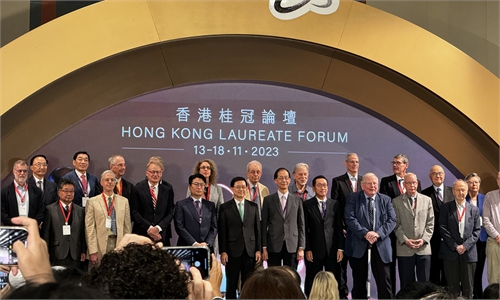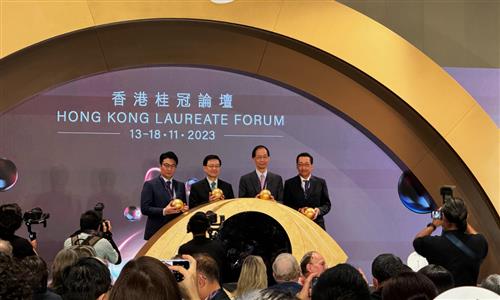
Hong Kong Photo: VCG
The Digital Currency Institute of the People's Bank of China and the Hong Kong Monetary Authority (HKMA) are carrying out the second phase of technical testing on the use of digital yuan in cross-boundary payments, involving more banks in Hong Kong and the use of the Fast Payment System to top up digital yuan wallets, an official from the Hong Kong Special Administrative Region (HKSAR) said on Wednesday.
Christopher Hui Ching-yu, the secretary for Financial Services and the Treasury of the HKSAR, made the comments in the Legislative Council, noting that cross-boundary fintech collaboration is very important to promoting mutual access of e-payments between the Chinese mainland and Hong Kong.
Hui said that digital yuan will offer residents of both places an additional means of payment for cross-boundary retail consumption that is secure, convenient and innovative, thereby enhancing efficiency and user experience of cross-boundary payment services.
"As I announced at the Hong Kong FinTech Week 2023 earlier this month, the Octopus Cards Limited (OCL), an e-payment platform with the highest customer penetration rate in Hong Kong, and the Bank of China in Hong Kong will seek to explore new digital yuan application scenarios, with a view to benefitting both mainland visitors to Hong Kong and Hong Kong residents visiting the mainland," Hui said.
"Subject to regulatory approval and technical readiness, we welcome the OCL to provide an inbound solution facilitating mainland tourists' use of digital yuan in Hong Kong through topping up Octopus cards in tourist mobile apps," Hui noted.
"As one of the freest economies in the world, Hong Kong has a mature financial market and regulatory system, providing a good environment for the application of digital yuan as well as the internationalization of the yuan. In addition, HKSAR has close economic ties with the mainland, and the circulation and use of the Chinese currency in Hong Kong has a broad base," Wang Peng, an associate researcher at the Beijing Academy of Social Sciences, told the Global Times on Wednesday.
On November 9, speaking at the 2023 Financial Street Forum annual conference, Hui said that as Belt and Road Initiative(BRI) partner countries increasingly use the Chinese currency for cross-border trade settlement, there is a growing demand for yuan investment products and risk management solutions in these economies.
The promotion of digital yuan and the internationalization of the Chinese currency will further consolidate Hong Kong's position as an international financial center, Wang noted.
"The launch of digital yuan will enhance the efficiency and user experience of cross-border payment services, attracting more international enterprises and investors to use the yuan for cross-border transactions, thereby bringing more vitality and opportunities to Hong Kong's financial market," the expert said.
With the yuan's internationalization, Hong Kong's position as an offshore yuan market will become more important. The offshore market is a key link in the process of yuan internationalization, and will provide global investors with more yuan-denominated financial products and services, Wang added.
HKSAR Chief Executive John Lee Ka-chiu said on Wednesday that the central financial work conference held in Beijing emphasized the need to consolidate and enhance Hong Kong's status as an international financial center. This not only demonstrates the central government's high recognition of Hong Kong's status, but also shows its high expectations for Hong Kong to achieve high-quality financial development.
Lee noted that Hong Kong will continue to capitalize on its strengths by actively attracting talent and expanding its economic and trade networks. While maintaining a high degree of internationalization, HKSAR will take a more proactive role in integrating into the overall development of the country, contributing to national strategies such as the construction of the Guangdong-Hong Kong-Macao Greater Bay Area and the BRI, so as to inject kinetic energy into the economy.
Global Times


